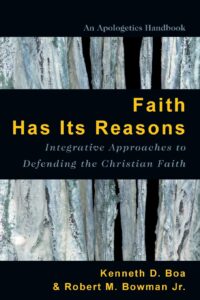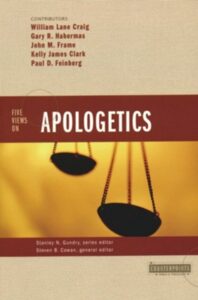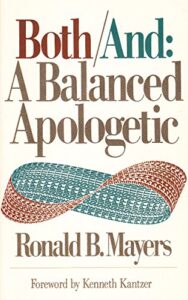
Boa and Bowman provide a detailed overview of popular apologetic approaches in Faith Has Its Reasons.
“…but in your hearts honor Christ the Lord as holy, always being prepared to make a defense to anyone who asks you for a reason for the hope that is in you; yet do it with gentleness and respect” (1 Peter 3:15)
People who strive to defend the Christian faith frequently cite this verse as something like a mission statement. This is because the words “make a defense,” which is also translated as “give an answer” (NKJV), comes from the Greek word apologia, which is where the term apologetics comes from. Thus, a person defending the Christian faith is called an apologist, and they are engaged in apologetics.
There are multiple approaches to doing apologetics, and they are generally dependent on one’s personality, theology, goals, training, or areas of interest. For example, some apologists focus primarily on defending one aspect of the faith or the Bible, while others strive to defend the entirety of Scripture. Several years ago, I was in a doctoral course on apologetic methodology led by Dr. Gary Habermas, a leading evidentialist (discussed later). One of our assignments was to give a two-hour presentation and defense of a methodology other than our own. We were also required to write a 25-page paper on our own apologetic approach as well as two 10-page papers on other views besides our own or the one we defended in the presentation. In other words, we were expected to gain a deeper understanding of these apologetic views.
Before surveying three of the most popular apologetic methodologies to discover their commonalities and how they differ, it is important to make a couple of points about 1 Peter 3:15. First, the Christian apologist must strive to make his defense “with gentleness and respect.” Second, he must have a desire to honor Jesus Christ rather than stoke his own pride through his apologetic endeavors. Apologists generally spend much of their time studying the objections to the Christian faith and learning how to respond to them. Since the acquisition of knowledge can fuel pride, apologists must guard against an intellectual pride that can so easily tempt us as we dive deeper into our research.
The third point is a bit nuanced. By itself, 1 Peter 3:15 is not technically an instruction to defend every portion of the Bible. Peter told his readers to give their defense to those who ask “for a reason for the hope that is in you.” In the context of this letter, Peter reveals that the “hope” being spoken of is a “living hope” we have “through the resurrection of Jesus Christ” (1 Peter 1:3). Because God raised him from the dead, we have confidence that God will give believers “an inheritance that is imperishable, undefiled, and unfading” (v. 4). Therefore, in 1 Peter 3:15, the apostle instructed his readers to be willing to offer a defense of that hope—that God raised Jesus and will raise us as well. Nevertheless, the concept of defending the whole Bible is perfectly consistent with other passages of Scripture and the examples of Jesus and the apostles. ((For example, Jesus said that Scripture could not be broken (John 10:35), and He regularly cited it as authoritative (Matthew 4:4, 7, 10) and historically accurate (Matthew 19:4–6). Paul also cited it as authoritative and stated that all Scripture is breathed out by God (2 Timothy 3:16).))
With those points in mind, let’s turn our attention to some of the more common approaches to defending the Christian faith. There are several ways to classify these approaches, and each of the methodologies can be divided into smaller groups that have their own preferences on how one should do apologetics. We will briefly define each view, list some of its adherents, describe its perceived strengths from the perspective of its proponents, and list a few objections from those who use a different approach. Of course, supporters of each respective view might prefer to describe their approach in a slightly different way, and they have likely offered responses to the objections that may or may not convince those who disagree. Those discussions move far beyond the scope of this article, which is meant to give a balanced overview of three major apologetic approaches used by Christians today.
Classical Apologetics
Classical apologetics strives to show that Christianity is rational by showing how it is “logically coherent and supportable by sound arguments” through the use of proofs, particularly philosophical proofs for the existence of God. ((Kenneth D. Boa and Robert M. Bowman, Faith Has Its Reasons: Integrative Approaches to Defending the Christian Faith, second ed. (Colorado Springs, CO: Biblical, 2005), 49.)) Notable classical apologists include Thomas Aquinas, B.B. Warfield, C.S. Lewis, Norman Geisler, and William Lane Craig. For the classical apologist, demonstrating God’s existence through these proofs is seen as the first step in defending the Christian faith. The goal here is often to prove theism—that one all-powerful, all-knowing Creator exists. Of course, this stops short of demonstrating that Christianity is true. But if they succeed in this endeavor, they generally attempt to use historical and scientific evidence to show the truth of Christianity’s unique claims, particularly those related to the historicity of Jesus’ life, death, and resurrection, as well as the reliability of Scripture.
The philosophical proofs marshaled in support of God’s existence generally include the cosmological, teleological, ontological, and moral arguments. In its most common form, the cosmological uses the law of cause and effect to demonstrate that an all-powerful intelligent being created everything. The teleological argument is also known as the design argument, and it looks at the complexity and design found in nature, from the “fine-tuning” of the solar system to the intricacies of life. This argument seems to fit well with Paul’s claim in Romans 1:20 that a person can know about the Creator through what has been made. The ontological argument attempts to philosophically demonstrate that God is a necessary being—that he must exist. And the moral argument is used to show that our standard of morality must come from someone who is the perfect standard of morality. Individual classical apologists may not rely on each of these to build their case, but it is not uncommon to find those who utilize all four to show that God is the all-powerful, all-knowing, perfectly good, and necessary Creator of the universe.
Those who favor a different approach to apologetics have cited some drawbacks to classical apologetics. First, some of the philosophical argumentation can be too difficult to follow for many individuals. Second, if the historical and scientific evidence used in the classicist’s second step is sufficient to demonstrate the truth of Christianity, why bother going through the rigamarole of the more difficult philosophical arguments in the first place? Third, the classicist may be underestimating the role a person’s worldview has on their thinking. In particular, the unbeliever is often motivated to “twist the evidence according to nontheistic presuppositions.” ((John Frame, “A Presuppositionalist’s Response” in Stephen B. Cowan, Five Views on Apologetics (Grand Rapids, MI: Zondervan, 2000), 81.))
Evidential Apologetics
While classical apologetics has been the most common approach throughout church history, evidential apologetics has been the most popular methodology in the United States in modern times. Evidentialists appeal to historical studies and scientific arguments to demonstrate that Christianity is true. While acknowledging that such an approach cannot lead to absolute certainty, evidentialism posits that Christianity alone best accounts for historical facts and scientific findings; therefore, they argue that Christianity is highly probable. ((Boa and Bowman, Faith Has Its Reasons, 139.)) Joseph Butler, John Warwick Montgomery, Lee Strobel, Gary Habermas, and Josh McDowell are well-known adherents to this approach.

Check out Five Views on Apologetics if you want to see how leading apologists from five perspectives present and defend their views and respectfully dialogue with each other.
Evidentialists can draw from a wide variety of subjects related to defending the truth of Scripture. Some, like Gary Habermas, focus primarily on the resurrection of Jesus Christ. Others, such as Josh McDowell, emphasize arguments for the reliability of Scripture, particularly the Gospel accounts, while others cite fulfilled prophecy, defend miracles, or archaeological finds. Evidentialists have cited passages in the Gospel of John to support their belief that evidence can be presented to defend the faith and play a role in the conversion of sinners. In John 5:36, Jesus appealed to the works that he did claiming that “the very works that I do—bear witness of Me” (cf. John 10:25). Later, he stated that even “though you do not believe Me, believe the works, that you may know and believe that the Father is in Me, and I in Him” (John 10:38). And, in John 11:45, many of the Jews who witnessed Jesus raise Lazarus from the dead “believed in him,” as did some who later saw Lazarus alive (John 12:9–11).
Evidentialists claim that their approach corresponds well to our modern legal system and the way many people make decisions on important subjects. That is, the legal system is based on weighing evidence for or against a particular scenario, and many people will consider the evidence presented to them before making decisions in everyday life. Thus, unlike the sophisticated philosophical arguments utilized by the classical apologists, the arguments used by evidential apologists are generally easy to follow.
Although it has been the most popular approach in recent years, evidential apologetics faces its share of objections. Like classical apologists, evidentialists can underestimate the impact a person’s worldview has on their interpretation of the evidence. To be fair, well-informed classical and evidential apologists acknowledge that everyone holds certain presuppositions, thus it is fallacious to label them as empiricists. ((Although he is a leading evidentialist, Gary Habermas repeatedly acknowledged the role of presuppositions during my doctoral seminar on apologetic methodology. He also wrote the following: “No one can view a topic apart from a particular viewpoint. It is impossible to lay one’s beliefs aside and study the pure evidence without respect to a particular outlook.” Gary Habermas, “An Evidentialist’s Response [to Presuppositionalism]” in Steven B. Cowan, gen. ed., Five Views on Apologetics (Grand Rapids, MI: Zondervan, 2000), p. 237. Most of the students in my doctoral seminar ended up endorsing an eclectic approach that utilizes parts of each methodology described in this article.)) Second, it can be tempting to overstate the strength of one’s case while discussing subjects from the ancient past for which we have scant evidence. Third, evidentialists do not usually discuss the impact of one’s worldview when assessing the strength of the apologist’s case. So, rather than seeing the arguments as evidence for Christianity, the unbeliever will usually interpret the evidence differently on the basis of his or her worldview. ((Boa and Bowman, Faith Has Its Reasons, 217.))
Presuppositional Apologetics
If one can rightly say that classical apologists emphasize reason and evidentialists emphasize facts, then it seems fair to say that presuppositional apologists emphasize revelation, more specifically, God’s revelation of himself in Scripture. Presuppositional apologetics, in its current forms, is largely indebted to Cornelius Van Til and two of his students, Greg Bahnsen and John Frame. Van Til sought to develop a distinctly Reformed apologetic, believing that the classical and evidential approaches elevated man to be the ultimate determiner of truth and compromised key biblical doctrines. ((Cornelius Van Til, The Defense of the Faith (Philadelphia, PA: Presbyterian & Reformed, 1955), 257–259.)) Some apologists from the Reformed tradition, such as R.C. Sproul and John Gerstner, have disagreed with Van Til’s approach and favored classical apologetics.
Presuppositionalism teaches that a person’s worldview determines how they interpret evidence. Thus, they believe it is futile to use the evidential or classical approaches with an atheist, because, as a materialist, the atheist will never acknowledge or conclude that God exists, and, because of their fallen human nature from Adam, it is impossible for them to reach that conclusion. ((Indeed, Van Til stated that it is “logically quite impossible for the natural man, holding as he does to the idea of autonomy, even to consider the ‘evidence’ for the Scripture as the final and absolutely authoritative revelation of the God of Christianity.” Ibid., 142.))
Furthermore, presuppositionalists espouse certainty of their beliefs rather than arguing for Christianity being the most reasonable conclusion, as is often done by classicists and evidentialists. Presuppositionalists have stated that the proof that Christianity is true is that if it were not true, then we could not have certain knowledge of anything. Van Til wrote, “The best, the only, the absolutely certain proof of the truth of Christianity is that unless its truth be presupposed there is no proof of anything. Christianity is proved as being the very foundation of the idea of proof itself.” ((Ibid., 298.)) Therefore, for the presuppositionalist, the fact that we have knowledge, use logic, or strive to uphold moral standards demonstrates the truth of Scripture since, as they often argue, these things can only be rationally and consistently explained from a biblical worldview. In a sense, presuppositionalism goes on the offense against the other person’s worldview more than it defends the Christian faith.

In Both/And: A Balanced Apologetic, Ronald Mayers makes the case that Christian apologists should consider using a balanced approach rather than one methodology to the exclusion of another.
While the atheist may uphold moral standards and use logic, they have no basis for these things from within their naturalistic worldview since the moral law and laws of logic are immaterial. Presuppositionalists highlight the inconsistency of the naturalistic worldview, pointing out that the atheist unwittingly acknowledges the truth of the biblical worldview when they use logic or appeal to morality. As with classical apologetics, the arguments for presuppositionalism are often rather philosophical and can be difficult to follow
Presuppositionalism, like the other views mentioned above, has its detractors who have raised objections to it. First, while they rightly point out that everyone starts with presuppositions, they have “imported an entire worldview when the others have only asked for tools.” ((Habermas, “An Evidentialist’s Response,” in Cowan, Five Views on Apologetics, p, 242.)) That is, as the classical apologist starts with the tool of reason and the evidentialist with the tool of sense experience to build their systems, the presuppositionalist “assumes the tool of special revelation and the system of Scripture…he assumes the reality of God’s existence, his personal interaction with humans, plus a specific product: Scripture.” ((Ibid.)) Second, many elements of presuppositionalism depend upon Reformed theology, particularly its emphasis on man’s depravity. ((While Christians from a variety of theological persuasions believe that everyone inherits Adam’s sin nature, they disagree on what that corruption entails. Reformed theology proponents generally hold to a view known as total depravity, sometimes called total inability to distinguish it from other views of depravity, which teaches that “as a consequence of the Fall of man, every person born into the world is morally corrupt, enslaved to sin and is, apart from the grace of God, utterly unable to choose to follow God or choose to turn to Christ in faith for salvation.” See www.theopedia.com/total-depravity.)) For example, how could so many Jews begin believing in Jesus after seeing the evidence of Lazarus raised from the dead (as cited earlier) if the unbeliever can never reason to God through the evidence, their nature being so thoroughly corrupt, as Van Til maintained? Third, while they recognize the existence of many other worldviews, some presuppositionalists tend to treat all unbelievers as though they hold a naturalistic worldview even though most of them do not. This is seen in the way that some of these individuals conflate terms like atheist, skeptic, critic, unbeliever, etc.
Conclusion
Other apologetic methodologies have been utilized by Christians throughout the centuries. While many Christians strongly prefer one method over the others, some Christians have adopted an approach that combines elements from each system in their defense of the Christian faith and the Bible. ((See Ronald B. Mayers, Both/And: A Balanced Apologetic (Chicago, IL: Moody, 1984).))
Many volumes have been written to explain these systems in more detail or to argue why one approach is better than the others. This article does not pretend to offer a thorough examination of any of these views. Indeed, many more arguments and objections could be listed for each position, and proponents of each respective view have offered counterarguments to the various objections. Instead, this article offers readers a brief synopsis of three leading perspectives so that Christians may be better informed on approaches to defend their faith and Scripture. It is my hope that all Christian apologists will always follow Peter’s admonition to honor our Lord, and that they will be gentle and respectful when giving reasons for the hope that we have in Christ.
Let us also remember that while our defense of the faith can answer objections to the Christian faith and display its truthfulness, it is the gospel that “is the power of God for salvation to everyone who believes” (Romans 1:16). Thus, the apologist must always be ready to speak the truth in love and share the good news of Christ’s sacrificial death, burial, and resurrection. Perhaps the greatest apologetic Christians can practice is the love we have for one another. After all, Jesus said, “By this all will know that you are My disciples, if you have love for one another” (John 13:35).
